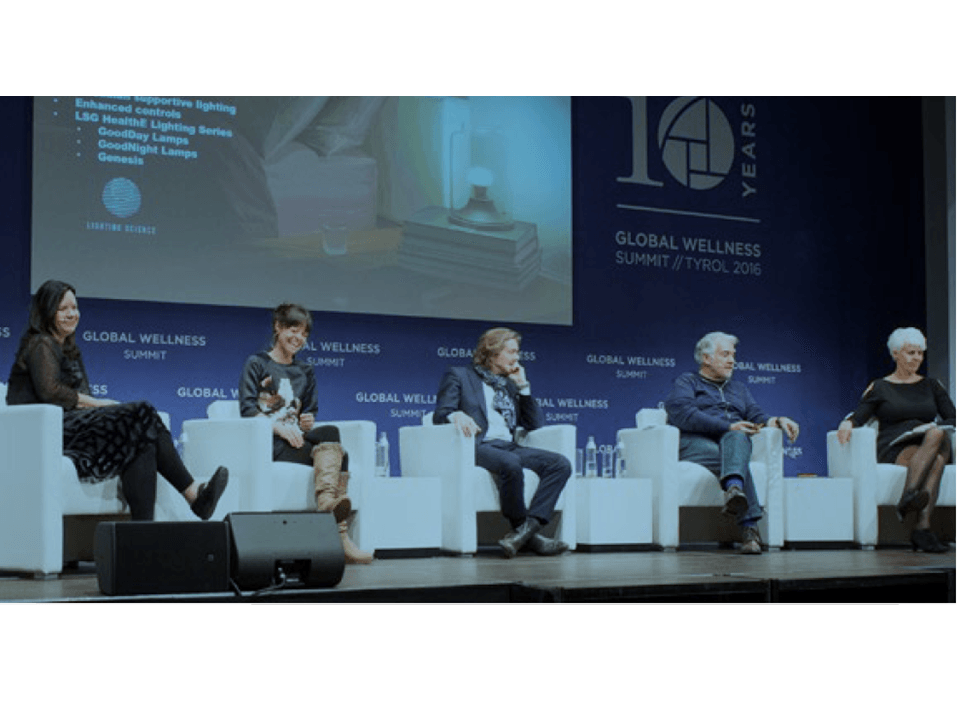The Global Wellness Institute has been a research partner of the Global Wellness Summit (GWS) since it was founded. And at the recent Summit in Kitzbühel, Austria, 500+ wellness experts from 46 nations (from the travel, spa, beauty, fitness, nutrition, technology, medical and architecture worlds) gathered to debate the future of the $3.7 trillion wellness industry. And when that happens you get a uniquely informed and global view of the trends coming in 2017 – and beyond. These wellness trends have a “get real” quality (not the “charcoal is the new kale” variety). From architects finally designing buildings for human health to the many new directions ahead in mental wellness to a wellness industry that will become more democratized, reaching beyond its narrowing association with wealthy elites. To read the full, 55-page report, click here.
Trend # 1 — Sauna Reinvented
Something both hot and very cool: the reinvention of sauna that’s underway. From “Sauna Aufguss” events where “sauna-meisters” conduct theatrical performances of infusions, song and dance. To hip, social “amphitheater” or “hangout” saunas (whether Helsinki’s new high-design Löyly sauna complex or Scotland’s new loch-side “Hot Box” with DJ and bar). To quirky pop-up saunas floating on lakes or hanging from bridges. To trendy urban “sweat lodges” serving up infrared sauna treatments, like NYC’s Higher Dose. No longer a solitary, “meh” experience, the new, spectacular, social saunas are some “outside of the box” thinking…literally.
Trend #2 — Wellness Architecture
Architecture has long been preoccupied with surface aesthetics: “starchitects” designing to wow or shock, but with little attention paid to creating buildings that improve the health of the humans living within. Change is finally here: “living buildings” that grow their own energy; responsive architecture that tailors indoor health experiences for every inhabitant; phone apps alerting you when you’re entering a “sick” building; dawn-simulating lighting easing you into your day. Everything “built” is getting reengineered: from indoor air quality (a killer) to sleep and acoustics.
Trend #3 — Silence
In a world of 24/7 connectedness, wellness destinations are embracing a dramatic approach to “turning off” the noise: true silence. For example, the first completely “Silent Spa” (with stunning church-inspired architecture) just opened at Austria’s Therme Laa Hotel. And new “wellness monasteries” are on the rise: retreats opening in, and infused with the silent, contemplative values of, ancient sacred spaces – like Italy’s soulful Eremito, with no WiFi/phone signal and silent, candlelit dinners. Properties like Germany’s Brenner’s Park have even installed “digital kill switches” for totally silent rooms. And “silent” restaurants, salons, gyms, stores and airports are all being unveiled…
Trend #4 — Art & Creativity Take Center Stage
Born of a storied history, but forgotten of late, the creativity-wellness-spa connection is making a comeback: with more art, music, literature and dance (both as experienced and “to do”) at the center of more wellness experiences. Look for more performance, like at Germany’s famed spa resort, Schloss Elmau, where musicians and writers “play-to-stay” (making possible 200+ concerts a year) – or live classical violin while taking the waters at the UK’s new Gainsborough Bath Spa Hotel. We’ll see more sophisticated, “beyond the adult coloring book” programming launch, like painting classes under the stars – as well as a profusion of multi-sensory experiences, from sound baths to “yoga concerts.” The creative arts have a future starring role in wellness.
Trend #5 — Wellness Remakes Beauty
Beauty, the goliath industry ($1 trillion) of the $3.7 trillion wellness economy, is remaking itself to meet the needs of a wellness-oriented population obsessed with authenticity and “inner beauty.” From an avalanche of eatable/drinkable beauty-boosters and clean, organic cosmetics – to medical evidence for a new “neuroaesthetics” (the brain is wired to respond to beauty) – the “beauty comes from within” concept will keep gaining on superficial (topical) models. And preventative approaches will keep gaining on the old “cosmetic repair.” We will continue to learn (and snap up solutions that tackle) how beauty is far more than skin deep.
Trend #6 — The Future is Mental Wellness
When it comes to mental wellness, our world has a problem: depression and anxiety is skyrocketing, and by 2030, the former will be the #1 health issue, outranking obesity (WHO). So look for dramatically more “healthy mind” approaches in coming years. Wellness retreats and spas are adding neuroscientists and psychotherapists (like London’s ESPA Life at Corinthia Hotel). Meditation is not only radically mainstreaming (even on-demand in hotel rooms), but spawning creative new breeds (from “dream” to “floating” meditation). We’ll see everything from new part-mind/part-body workout brands to apps that track your mental state (think MindBit, not FitBit). Because “mind” will finally get equal billing with “body.”
Trend #7 — Embracing the C-Word
The wellness world is waking up to the needs of a surprisingly underserved population: cancer patients. For instance, Julie Bach’s pioneering “Wellness for Cancer” program means wellness companies/spas are finally trained to deliver comfort (and dignity) to cancer sufferers. From ESPA’s “Nurture and Support” program to Natura Bissé’s “oncological aesthetics” to Two Bunch Palms’ “Mindful Touch Massage”, wellness practitioners are finally opening their hearts and healing practices to cancer patients.
Trend #8 — Beyond the Elite “Ghettos” of Wellness
In a world where rising income and “well-being” inequalities are fueling a populist backlash, a wellness industry that’s become narrowly associated with rich elites (those $300 yoga pants and Reiki sessions) will change. More wellness businesses will give back to the “other 99%”, like “Yoga Gives Back” helping poor women in India – or Newfoundland’s Fogo Island Inn, where every dollar of profit goes back to its economically-challenged island community. A “Wellness Tourism 2.0” will rise: a development model thinking beyond the (often elite, “gated”) property to creating whole towns, regions and even nations, where a comprehensive wellness vision (from protected nature to a sustainable, healthy food supply) benefits BOTH locals and tourists. The new wave of low-cost “wellness” is part of this democratization: like more affordable healthy supermarkets and spa chains. But with some future mindfulness about “rock-bottom” vs. “fair” pricing, given the human labor that delivers so many of these healthy experiences.
About the Global Wellness Summit: The Global Wellness Summit (GWS) is an invitation-only international gathering that brings together leaders and visionaries to positively shape the future of the $3.7 trillion global wellness economy. Held in a different location each year, Summits have taken place in the U.S., Switzerland, Turkey, Bali, India, Morocco, Mexico and Austria. The next will be held at The Breakers, Palm Beach, Florida from Oct. 9-11, 2017.
This article was originally published by The Global Wellness Brief. You can read the original article here: http://www.globalwellnesssummit.com/press-release-eight-wellness-trends-for-2017/


